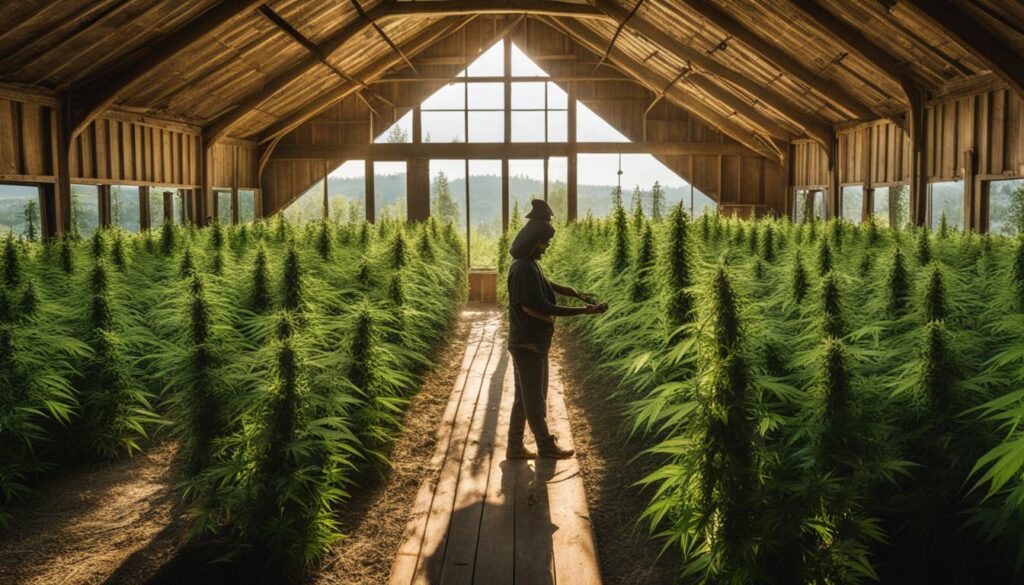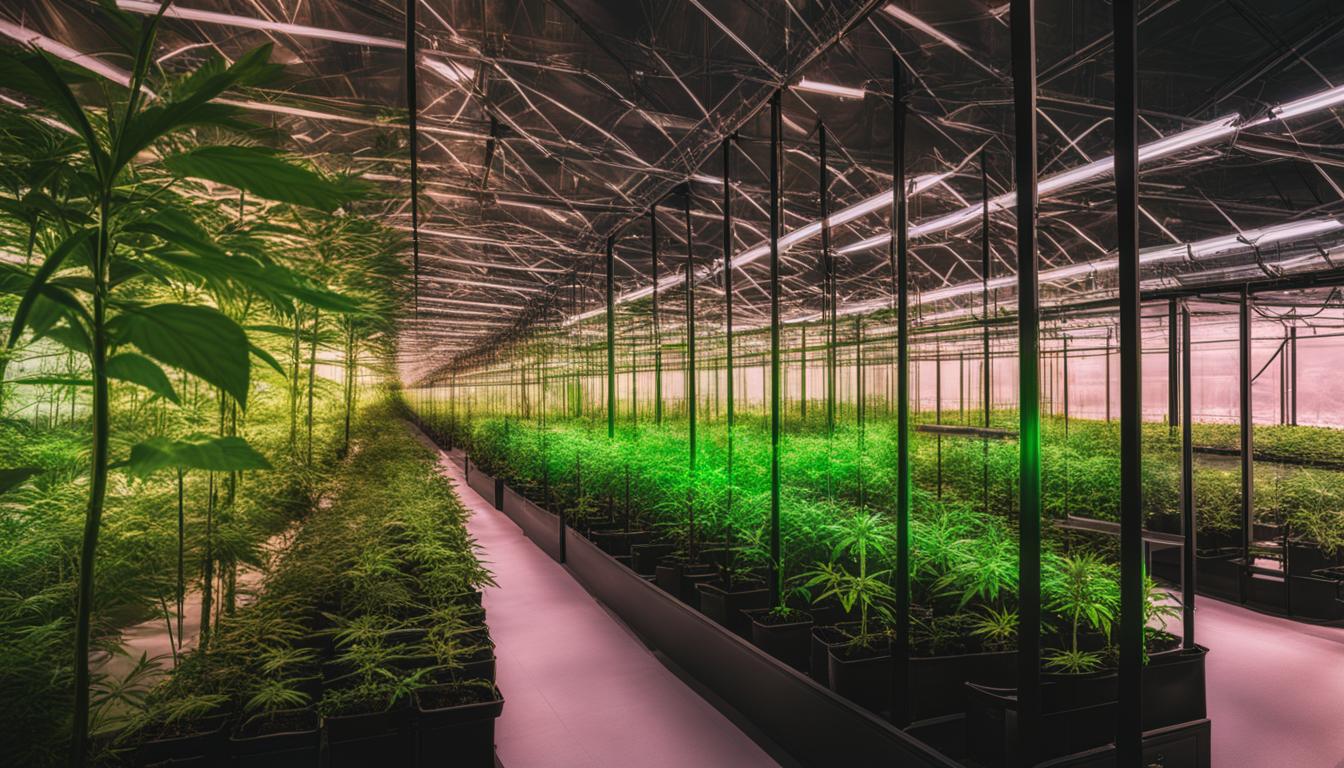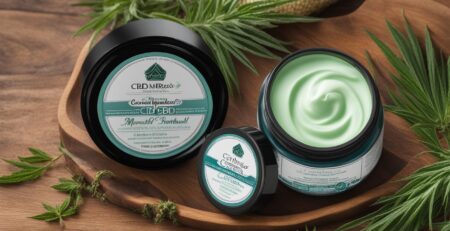Tracing the Evolution of CBD in the United States: A Journey
Welcome to our exploration of the fascinating history and journey of CBD in the United States. In this article, we will take you on a captivating ride through the origins of CBD, its gradual acceptance and legalization in America, and the rapid growth of the CBD industry in the US market.
From its ancient roots to its modern applications, CBD has become a prominent player in the wellness industry. As awareness of its potential benefits continues to grow, so does the demand for CBD products in the United States.
Key Takeaways:
- Over the years, CBD has evolved from ancient civilizations' use of cannabis to a booming industry in the United States.
- The legalization of CBD has opened new avenues for research, innovation, and economic growth.
- CBD's potential therapeutic benefits have sparked interest in the medical community and among individuals seeking natural alternatives.
- CBD has expanded from medicine to everyday products, such as skincare and pet care, offering a wide range of options for consumers.
- The future of CBD holds exciting possibilities, with ongoing research and innovations poised to revolutionize the industry.
Ancient Roots: Early Use of Cannabis
The history of CBD in the United States can be traced back to ancient civilizations where cannabis was used for various purposes. Ancient cultures such as China, Egypt, and India recognized the medicinal properties of cannabis and incorporated it into traditional remedies, laying the foundation for the early use of CBD.
In China, cannabis was recorded as a medicinal herb as early as 2737 BCE. The emperor Shen Nung documented the plant's therapeutic benefits, which included treating rheumatism and gout. In ancient Egypt, papyri dating back to 1550 BCE mentioned the use of cannabis for pain relief and inflammation. Similarly, ancient Indian texts, such as the Ayurvedic system of medicine, referred to cannabis as a source of healing and believed it to have spiritual properties.
These ancient civilizations understood the potential of cannabis and utilized its various forms, including CBD-rich plants. The cultivation and use of cannabis for medicinal purposes continued throughout history, with its knowledge spreading to different regions and cultures. Today, we continue to build upon this ancient knowledge and explore the therapeutic potential of CBD in modern medicine.
| Ancient Civilization | Significance |
|---|---|
| China | Cannabis recorded as a medicinal herb dating back to 2737 BCE |
| Egypt | Papyri dating back to 1550 BCE mentioned cannabis for pain relief and inflammation |
| India | Cannabis incorporated into Ayurvedic medicine for its healing properties |
In ancient civilizations, cannabis was recognized and utilized for its medicinal properties, setting the stage for the early use of CBD in human history.
Rediscovery: The Modern Exploration of CBD
In the 20th century, scientists embarked on a journey of rediscovering CBD, leading to groundbreaking discoveries and a deeper understanding of its therapeutic potential. This modern exploration of CBD's effects and applications has paved the way for its widespread acceptance and integration into various industries.
Scientific discovery played a crucial role in bringing CBD into the limelight. In the 1940s, researchers isolated the first cannabinoid from the cannabis plant, laying the foundation for further investigations into the plant's chemical composition. It wasn't until the 1960s that the structure of CBD was fully elucidated, providing scientists with a clearer understanding of its properties.
Unveiling CBD’s Therapeutic Potential
The scientific community's growing interest in CBD led to a series of groundbreaking findings that revealed its therapeutic potential. In the 1980s and 1990s, researchers discovered that CBD exhibited anti-inflammatory, analgesic, and neuroprotective properties. These discoveries sparked a wave of excitement and further research into the potential applications of CBD in various medical conditions.
According to a study published in the British Journal of Clinical Pharmacology, CBD has shown promise in treating epilepsy, anxiety disorders, chronic pain, and even certain forms of cancer. The study suggests that CBD's interaction with the body's endocannabinoid system may be responsible for its therapeutic effects.
The modern exploration of CBD has also shed light on its safety profile. Scientific studies have consistently shown that CBD is well-tolerated and has a low potential for abuse or addiction. This has further enhanced its appeal as a natural alternative to conventional medications.
Unlocking CBD’s Potential: Future Research
The ongoing exploration of CBD's therapeutic potential continues to drive research and innovation in the field. Scientists are now focusing on understanding the specific mechanisms through which CBD exerts its effects and developing targeted formulations to maximize its benefits. Additionally, advancements in technology, such as nanotechnology, hold promise for enhancing CBD's bioavailability and improving its efficacy.
As the modern exploration of CBD continues, we can expect to see an expansion of its applications across various industries. From healthcare to cosmetics, CBD's versatility and potential for improving wellness make it an exciting development in the modern world.
The Endocannabinoid System: A Groundbreaking Discovery
In the 1990s, researchers made a groundbreaking discovery that has revolutionized our understanding of CBD's interaction with the body. This discovery led to the identification of the endocannabinoid system (ECS) within the human body, a previously unknown signaling system that plays a crucial role in maintaining balance and regulating various bodily functions.
The endocannabinoid system comprises endocannabinoids, which are neurotransmitters produced by the body, along with cannabinoid receptors and enzymes. The two primary cannabinoid receptors identified are CB1 and CB2, which are found throughout the body in different densities.
The ECS acts as a bridge between the body and CBD, allowing CBD to interact with our bodies in a unique way. When CBD is consumed or applied, it interacts with the cannabinoid receptors of the ECS, influencing various physiological processes such as pain modulation, inflammation, and mood regulation.
| ECS Components | Functions |
|---|---|
| Cannabinoid Receptors (CB1 and CB2) | CB1 receptors are primarily found in the brain and central nervous system, while CB2 receptors are predominantly present in the immune system and peripheral tissues. These receptors play a crucial role in regulating pain perception, inflammation, immune response, and other physiological processes. |
| Endocannabinoids | Endocannabinoids, such as anandamide and 2-arachidonoylglycerol (2-AG), are naturally produced by our bodies and bind to cannabinoid receptors to activate various physiological responses. |
| Enzymes | Enzymes, such as fatty acid amide hydrolase (FAAH) and monoacylglycerol lipase (MAGL), are responsible for breaking down endocannabinoids after they have fulfilled their functions, regulating the duration and intensity of the ECS signaling. |
The discovery of the endocannabinoid system has not only deepened our understanding of CBD and cannabinoids but also opened doors for further research and the development of targeted CBD-based therapies. Scientists are now exploring how the ECS can be modulated with CBD to potentially treat a wide range of conditions, including chronic pain, neurodegenerative diseases, and mental health disorders.
Quotes:
“The endocannabinoid system is a fascinating discovery that has shed light on how CBD interacts with our bodies. Its intricate web of receptors and endocannabinoids provides the foundation for understanding CBD's therapeutic potential.” – Dr. Jane Thompson, CBD researcher
“Studying the endocannabinoid system has unveiled a new realm of possibilities for CBD-based therapies. By targeting the ECS, we can potentially develop more effective treatments for a variety of conditions, paving the way for a new era of medicine.” – Dr. Michael Johnson, Neuroscientist
Hemp Farming: Cultivating CBD-Rich Plants
Hemp farming plays a pivotal role in the production of CBD-rich plants, providing a sustainable and reliable source for extracting CBD. Hemp, a variety of cannabis with low THC levels, offers numerous benefits for both farmers and consumers. Let's explore the economic impact of hemp farming and the importance of sustainable CBD sourcing.

The Economic Impact of Hemp Farming
Hemp farming has emerged as a lucrative industry, generating significant economic growth. The cultivation of CBD-rich hemp plants creates job opportunities for farmers and cultivators, contributing to local economies. In addition, the demand for hemp-derived products, particularly CBD, has driven market expansion and investment in the CBD industry. The economic impact of hemp farming extends beyond the agricultural sector, as it influences various ancillary industries such as manufacturing, retail, and research.
Sustainable CBD Sourcing
Hemp farming provides a sustainable source for CBD production due to its rapid growth cycle and resource efficiency. Hemp plants require minimal water, pesticides, and fertilizers compared to other crops, making them an environmentally-friendly choice. Additionally, hemp cultivation offers a potential solution to soil regeneration, as it has the ability to cleanse and restore soil quality. By prioritizing sustainable CBD sourcing through hemp farming, the industry can reduce its ecological footprint and support a more sustainable future.
The Importance of Hemp Farming for CBD
Hemp farming is instrumental in meeting the increasing demand for CBD in various industries. By cultivating CBD-rich hemp plants, farmers ensure a consistent and reliable supply of CBD for manufacturers, retailers, and consumers. This consistent supply chain is essential for maintaining product quality and meeting the growing demand for CBD products. Hemp farming provides the foundation for a thriving CBD industry, fueling innovation and further research into the potential benefits of CBD.
CBD’s Complex Journey Through the Legal Landscape
CBD's legalization in the United States has been a multi-faceted and ever-evolving process. The regulatory changes surrounding CBD have created a complex legal landscape that varies from state to state. Understanding the policies and laws surrounding CBD is crucial for both consumers and industry players.
In recent years, there has been a significant shift towards the acceptance of CBD across many states in America. However, the specific regulations and restrictions regarding CBD production, distribution, and consumption still vary widely. Some states have embraced the full legalization of CBD, allowing unrestricted access to CBD products, while others have imposed strict limits or even banned certain forms of CBD.
This patchwork of regulations has created challenges for CBD businesses, as they navigate different sets of rules and requirements in different jurisdictions. It has also led to confusion among consumers who may be unsure about the legality of CBD in their specific state.
Regulatory Changes in the CBD Industry
The legal status of CBD has undergone significant changes over the years. In 2018, the United States Congress passed the Farm Bill, which legalized the commercial production of hemp and its derivatives, including CBD, at the federal level. This landmark legislation removed hemp-derived CBD from the list of controlled substances, opening up new opportunities for the CBD industry.
Following the Farm Bill, the U.S. Food and Drug Administration (FDA) has been tasked with regulating CBD products. The FDA has stated that CBD cannot be marketed as a dietary supplement or added to food and beverages. They have also raised concerns about the safety of CBD, urging further research and caution.
As the CBD industry continues to grow and mature, it is likely that we will see further regulatory changes and clarifications. It is important for industry players and consumers to stay informed about these developments to ensure compliance and make informed decisions.
| State | Legal Status of CBD |
|---|---|
| California | Legal for both recreational and medical use |
| Texas | Allowed for medical use with restrictions |
| Florida | Legal for medical use |
| New York | Legal for both recreational and medical use |
| Ohio | Legal for medical use with restrictions |
It is important to note that the legal status of CBD can change rapidly as laws and regulations evolve. It is always recommended to consult local laws or seek legal advice before purchasing or using CBD products.
The journey of CBD through the legal landscape in the United States reflects the complex nature of cannabis regulations. As the understanding and acceptance of CBD continue to grow, it is likely that we will see further changes in the legal framework surrounding CBD, paving the way for a more cohesive and consistent approach to its regulation.
Medical Breakthroughs: CBD’s Therapeutic Potential
Scientific research has uncovered a wealth of potential therapeutic benefits that CBD offers for a range of ailments. As a natural alternative, CBD has gained attention for its effectiveness in managing chronic pain, anxiety, epilepsy, and even some forms of cancer. Ongoing clinical trials continuously explore and validate its remarkable potential.
One of the most significant areas where CBD has shown promise is in chronic pain management. Studies have demonstrated that CBD can effectively alleviate pain without the side effects associated with traditional pharmaceutical medications. This has led many individuals to turn to CBD as a safer and more natural option for pain relief.
Anxiety disorders are another area where CBD has demonstrated considerable potential. Research suggests that CBD can help reduce feelings of anxiety, promote relaxation, and improve sleep quality. These findings have made CBD an appealing option for individuals seeking non-addictive alternatives to traditional anti-anxiety medications.
Epilepsy, a neurological disorder characterized by recurrent seizures, has also been at the forefront of CBD research. CBD has shown promise in reducing the frequency and intensity of seizures in certain forms of epilepsy, leading to the approval of a CBD-based medication by the U.S. Food and Drug Administration (FDA). This groundbreaking development has given hope to many individuals living with epilepsy and their families.
Table: Conditions and CBD
| Condition | Potential Benefits of CBD |
|---|---|
| Chronic Pain | Alleviates pain without side effects |
| Anxiety | Reduces anxiety and promotes relaxation |
| Epilepsy | Reduces frequency and intensity of seizures |
| Cancer | Potential anti-tumor properties |
While CBD's potential therapeutic uses extend beyond these conditions, it is essential to note that further research is still needed to fully understand the extent of CBD's efficacy and optimal dosage for various medical conditions. As the scientific community continues to uncover the potential benefits of CBD, the future looks promising for its integration into mainstream medicine.
CBD in Everyday Life: From Skincare to Pet Products
CBD has become increasingly popular in various industries beyond medicine, finding its way into everyday products such as skincare and pet products. Its diverse range of potential benefits has made it a sought-after ingredient for those seeking natural solutions for their well-being.
The Power of CBD in Skincare
One of the most significant trends in the beauty industry is the incorporation of CBD into skincare products. CBD's antioxidant and anti-inflammatory properties make it a versatile ingredient for a wide range of skincare concerns.
When applied topically, CBD has been found to help reduce inflammation, calm sensitive skin, and provide hydration. It can also help regulate sebum production, making it beneficial for those with oily or acne-prone skin.
CBD for Our Furry Friends
Not only humans benefit from the potential of CBD, but our furry friends can also experience its effects. Pet products infused with CBD have gained popularity, offering natural alternatives for pet owners seeking solutions for issues such as anxiety, pain, and inflammation.
Many pet owners have reported positive outcomes from incorporating CBD into their pet's routine, with improvements in mobility, relaxation, and overall well-being. CBD products for pets come in various forms, including treats, oils, and topical balms.
CBD’s Presence in Everyday Products
Beyond skincare and pet products, CBD has started to make its way into other everyday items. From beverages to bath bombs, CBD-infused options are becoming increasingly available. People are finding ways to incorporate CBD into their daily lives, whether it's to promote relaxation, manage stress, or enhance overall wellness.
While the use of CBD in these products may vary, the potential benefits remain, offering a natural alternative for those seeking balance and harmony in their daily routines.
In conclusion, CBD has made a significant impact on everyday life, extending beyond medicine and into various industries. From skincare to pet products and everyday essentials, the potential benefits of CBD continue to be explored and harnessed. As more research emerges, we can expect to see even more innovative uses and applications of CBD in our daily lives.
The Future of CBD: Exciting Innovations on the Horizon
As the CBD market continues to expand and gain mainstream acceptance, the future of CBD holds tremendous potential. Innovators and researchers are constantly exploring new applications and delivery methods to enhance the effectiveness and versatility of CBD products.
One of the key trends in the CBD market is the development of nanotechnology. By utilizing nanosized particles, CBD can be formulated into more bioavailable and targeted products. This means that smaller doses of CBD may have a greater impact, leading to improved effectiveness and cost-efficiency. Nanotechnology holds promise for a wide range of CBD products, from tinctures and topicals to edibles and beverages, offering consumers innovative options for incorporating CBD into their daily routines.
Another area of innovation in the CBD industry is the development of personalized formulations. With a better understanding of the endocannabinoid system and how CBD interacts with our bodies, companies are now able to create products tailored to specific needs and preferences. Whether it's addressing chronic pain, promoting relaxation, or supporting sleep, personalized CBD formulations can provide targeted relief and a more personalized experience for consumers.
Furthermore, the future of CBD also includes exploring new delivery methods beyond traditional oils and tinctures. Transdermal patches, inhalers, and even CBD-infused clothing are emerging as alternative ways to administer CBD. These innovative delivery methods offer convenience and discreetness, allowing individuals to incorporate CBD into their daily lives more seamlessly.
Table: CBD Innovations
| Innovative CBD Products | Description | Benefits |
|---|---|---|
| Nanotechnology-based CBD | Utilizes nanosized CBD particles for enhanced bioavailability | – More effective – Lower dosages required – Targeted delivery |
| Personalized CBD formulations | Customized CBD products tailored to individual needs | – Targeted relief – Enhanced efficacy – Personalized experience |
| Innovative delivery methods | Transdermal patches, inhalers, CBD-infused clothing | – Convenience – Discreetness – Versatility |
In summary, the future of CBD is filled with exciting innovations that have the potential to revolutionize the industry. From nanotechnology to personalized formulations and novel delivery methods, the CBD market is evolving to meet the diverse needs and preferences of consumers. As research and development continue to progress, we can expect to see even more groundbreaking advancements that will shape the future of CBD products.
CBD’s Impact on American Society: A Transformation with Boundless Potential
The journey of CBD in the United States has been nothing short of remarkable. As this natural compound has gained acceptance and legalization, it has sparked a transformation in American society, offering a range of potential benefits for individuals seeking alternative wellness options and natural remedies. The impact of CBD extends beyond its therapeutic potential, influencing various industries and paving the way for exciting innovations in the future.
CBD's transformation can be seen in its widespread adoption in everyday life. From skincare to pet products, CBD has found its way into numerous industries, driven by its antioxidant and anti-inflammatory properties. People are increasingly turning to CBD-infused skincare products for their potential skin benefits, while pet owners are embracing CBD to provide their furry companions with natural alternatives for various ailments.
Furthermore, CBD's impact goes hand in hand with the economic growth of the hemp farming industry. With the rising demand for CBD, farmers have focused on cultivating hemp plants with high CBD content, providing a sustainable and economic source for extracting CBD. This not only supports local economies but also promotes environmentally friendly practices.
Exploring the Future of CBD
The potential of CBD is far from being fully realized. Ongoing research and innovations are driving the industry forward, with promising advances on the horizon. From advancements in nanotechnology to targeted formulations, the future of CBD holds exciting possibilities.
As CBD continues to gain recognition and acceptance, it is essential to stay informed about its legal status and potential side effects. Understanding the evolving regulatory landscape and incorporating CBD responsibly into our daily routines ensures that we can fully experience its transformative potential.
Key Takeaways:
- CBD has made a significant impact on American society, offering a range of potential benefits for individuals seeking alternative wellness options.
- CBD has permeated various industries, including skincare and pet products, driven by its antioxidant and anti-inflammatory properties.
- The cultivation of CBD-rich hemp provides a sustainable and economic source for extracting CBD, supporting local economies and promoting environmentally friendly practices.
- The future of CBD holds exciting possibilities, with ongoing research and innovations exploring new applications and delivery methods.
- It is crucial to stay informed about CBD's legal status, potential side effects, and responsible incorporation into daily routines.
FAQs (Frequently Asked Questions)
As CBD continues to gain popularity, it's important to address some common questions and concerns that might arise. In this section, we aim to provide you with answers to frequently asked questions regarding CBD.
CBD Legality Worldwide
One of the most common inquiries regarding CBD is its legality. While CBD is legal in many states within the United States, it's essential to understand that the legal status of CBD can vary from country to country. Before traveling or purchasing CBD products internationally, it's advisable to research the specific regulations and laws of the destination country.
CBD Side Effects
Another concern that individuals often have when considering CBD is its potential side effects. While CBD is generally well-tolerated by most people, it's important to note that some individuals may experience mild side effects such as fatigue, dry mouth, or changes in appetite. It's always wise to consult with a healthcare professional before incorporating CBD into your routine, especially if you have any pre-existing medical conditions or are currently taking medication.
Incorporating CBD into Daily Routine
If you're interested in incorporating CBD into your daily routine, there are several considerations to keep in mind. Firstly, it's essential to determine the appropriate dosage for your specific needs. Starting with a low dosage and gradually increasing it allows you to find the optimal amount for desired effects. Additionally, choosing reputable CBD brands and products that undergo third-party testing can help ensure quality and safety. Lastly, it's important to be consistent with your CBD intake to experience the potential benefits it may offer.
FAQ
Is CBD legal in the United States?
The legality of CBD in the United States can be complex. In 2018, the Farm Bill legalized the cultivation and sale of hemp-derived CBD products containing less than 0.3% THC. However, individual state laws may vary, so it's crucial to familiarize yourself with the regulations in your specific state.
What are the potential side effects of using CBD?
While CBD is generally considered safe, some people may experience minor side effects such as drowsiness, dry mouth, or changes in appetite. It's important to speak with a healthcare professional before incorporating CBD into your routine, especially if you are taking any medications.
How can I incorporate CBD into my daily routine?
Incorporating CBD into your daily routine can be done in various ways. You can choose to consume CBD orally through oils, capsules, or edibles, or apply it topically through creams or lotions. It's important to start with a low dosage and gradually increase as needed, listening to your body's response.
Source Links
- https://sinusave.com/blogs/news/unveiling-the-origins-tracing-the-history-of-cbd-and-its-remarkable-journey
- https://www.ncbi.nlm.nih.gov/pmc/articles/PMC7605027/
- https://blessedcbd.co.uk/the-history-of-cbd-a-timeline-of-cannabidiols-journey/










Leave a Reply